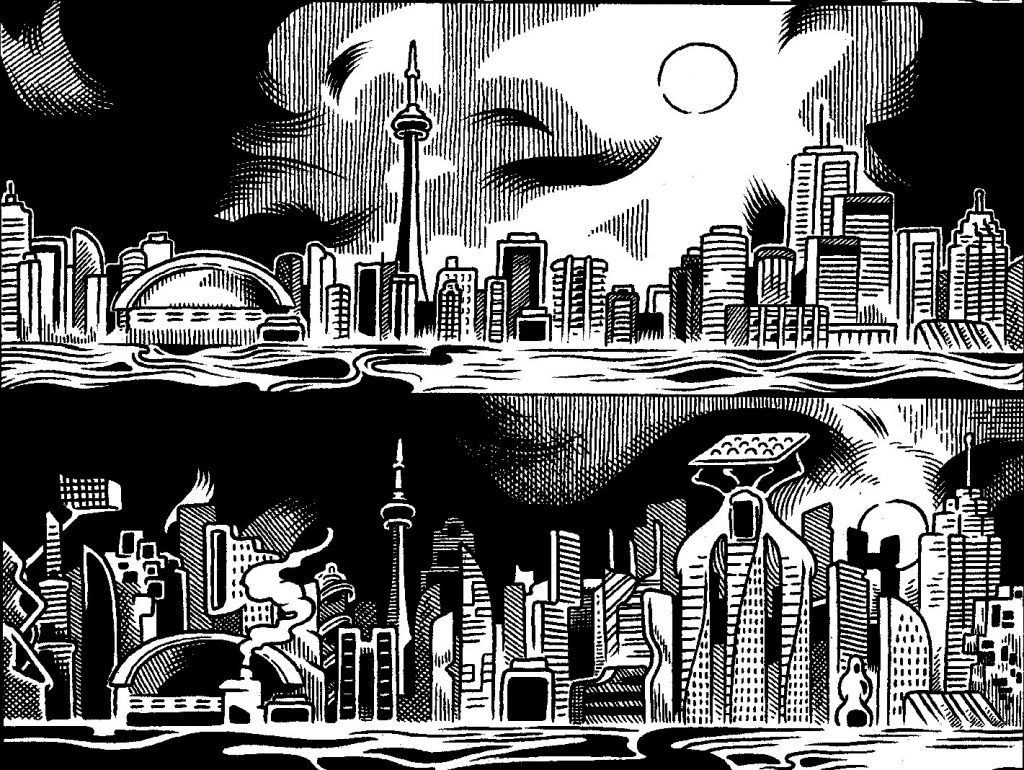
by Jonathan Valelly
photography by Greg Wong
From a hidden lookout point at the top of a glassy, austere tower development in the ever-expanding downtown core of Toronto, a masked evil mastermind explains why the city is the perfect site for a surreal, hyperspeed condo boom. “It’s been almost too easy setting up shop here,” she cackles. “In a city thirsty for world-class status, with hardly any regard for its own history…” It’s a dramatic, maniacal confrontation; a classic iteration of the supervillain climax scene. Yet this crucial moment in Condo Heartbreak Disco, the new full-length comic from artist Eric Kostiuk Williams and the indie comics powerhouse Koyama Press, feels unnervingly close to reality.
Condo Heartbreak Disco is larger than life, equal parts eviction drama, cosmic “superqueerdo” existentialism and buddy-cop comedy (if cops didn’t suck!). It also takes pointed aim at Toronto’s oh-so-real overdevelopment, getting more sinister by the day. “I kept trying to make exaggerated condo cityscapes in a weird, demented way,” Williams jokes. “But every time I drew one, I would look towards the waterfront and be like — oh, it looks like that already.”
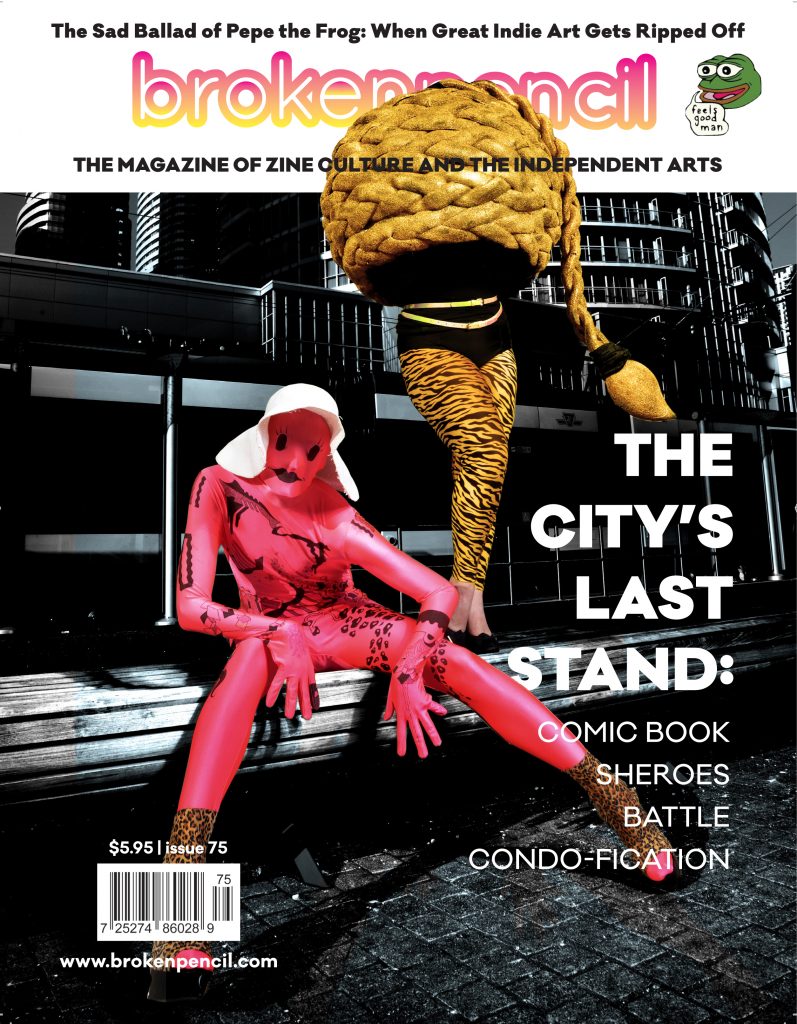
Against this backdrop of see-through high-rises towering menacingly over neighbourhood blocks we meet our protagonists: Komio and Willendorf Braid. The two shapeshifting cosmic femmes, whose trans-millennial trajectories have landed them in Toronto’s quickly-changing Parkdale neighbourhood, are finding themselves ever down on their luck. Komio, a mostly ethical vengeance dealer, still finds some work supporting the victims of macho downtown club culture. Braid’s offerings of holistic, emotional solace haven’t been paying the bills.
When the pair’s roommate breaks the news that they’re being evicted to make room for a yet another condo development, they plug into a more sinister, otherworldly plot behind the rapid erasure of Toronto’s most cherished yet unsung neighbourhoods. Evil corporate entities, exploiting the inroads made by a (somewhat) unwitting white creative class, seem hellbent on pushing late capitalist development to a bizarre climax — and it’s not clear that the heroes have the power to stop it.“They’re two kind of queer superhero characters who can’t save the day in the end,” explains Williams.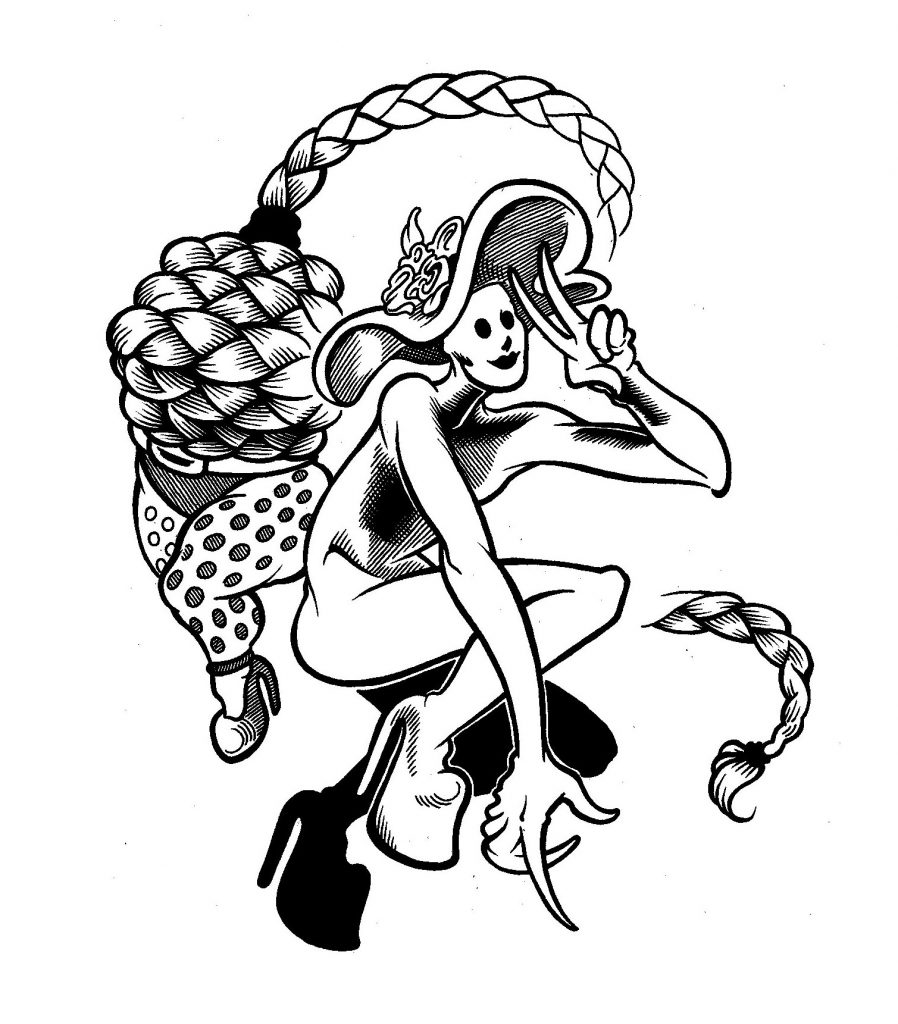
The protagonists’ attempts to involve themselves in humanity’s troubles acts as a stand-in for the political and ethical anxieties facing queers, people of colour, and artists in a changing city. How does an anti-capitalist queerdo adapt and survive in a time where greed is the winning motivator?
Condo Heartbreak Disco was a necessary project for Williams, who has been a Parkdale resident for most of his seven years in Toronto. In part, it also confronts his own role as a white queer artist relatively new to the tight-knit, but quickly gentrifying neighbourhood.
“There’s a bit of that sensibility in the two characters themselves,” he explains. “They’re artists, queers, trying to do the right thing, but they’re still sort of visitors. And I wanted to address that with the young, hip artist character who is super drawn to the authenticity of the neighbourhood, but is like a totally oblivious, privilege-wielding jerk.”
Here he’s referring to the comic’s unnamed, toque-wearing character who takes voyeuristic shots of long-time Parkdale residents on his phone, ringing in Instagram likes from peers and corporate trend-seekers alike. Through this character, the comic addresses the ways in which the lines aren’t always clear between being part of a community and exploiting it.
The story is squarely Torontonian, and feels achingly true, depicting a city quick to stamp out its vibrant underground cultures to make way for a restrictive vision of urban glory. As an example, Kostiuk Williams cites the displacement of the artists living at a warehouse at Queen St and Dovercourt St in the 2000s. The same artists who helped make Queen West “cool” were swiftly evicted and replaced with steely, hideous “artist’s condos.” One of the artists affected was Williams’ friend and collaborator Michael Comeau, who also works within the intersections of queer art and the comics world.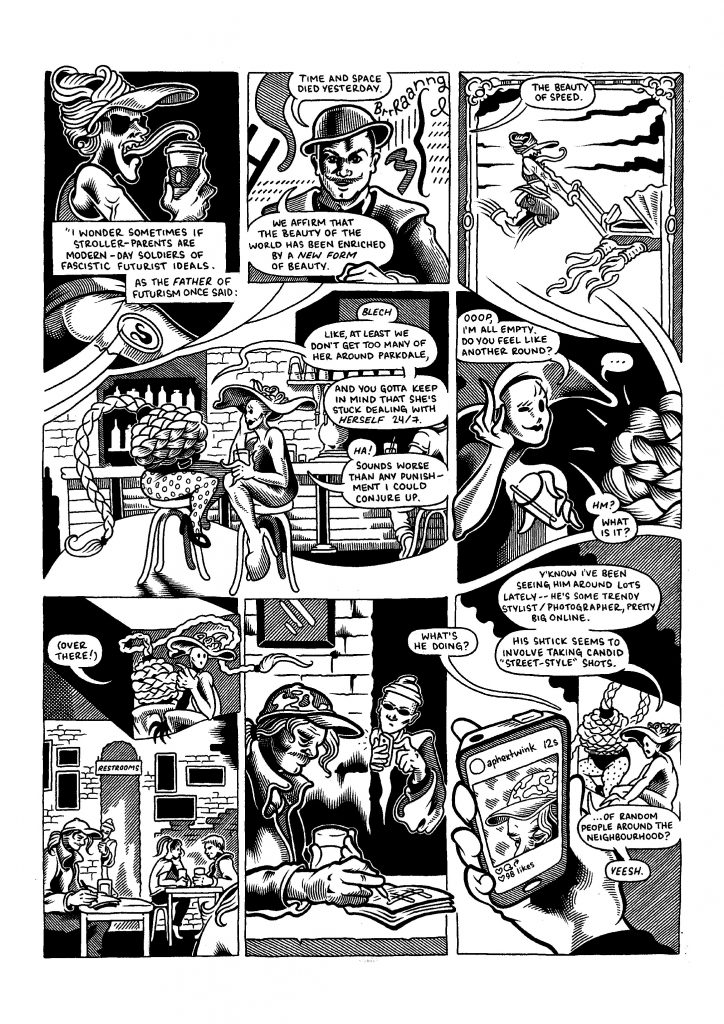
“I think everyone is stunned and exhausted by all the goodbyes we’ve said in the last few months to the spaces we shared,” reflects Comeau. “It is the sharing that is missed. It is a timely and worthwhile [endeavour] to fictionalize what is affecting so many in this city.”
The cycle of displacement continues in Toronto, most recently with the loss of DIY spaces like Soybomb and long-running show venues like The Silver Dollar and Holy Oak. “It’s part of our city’s weird cultural identity crisis. Like, Toronto wasn’t really intended to be that exciting of a place,” Williams ponders. “The interesting cultural things that did creep up during the ‘80s did so in spite of that. People weren’t thinking of the city in the ‘world class’ way they suddenly want to now.”
Williams’ artistic approach reflects a long-standing moral confusion of making art in and about a gentrifying world. A few years ago, he turned the dizzying landscape of gay clubs and the delirium of self-doubt into the spiracular page layouts and diva-driven dancefloor of Hungry Bottom Comics. With these releases, he splashed onto the indie comics scene with a remarkable capacity for surreal design and musical typography.
With Condo Heartbreak Disco,Williams’ signature style adapts and expands for new purposes — the pages are dense, and Williams’ figures, shapes and bodies bust across panels with unbothered pizzaz. At 50 pages, the illustrations are necessarily thick and evocative, finding creative ways to portray such slippery concepts as affective labour and capitalist accelerationism (seriously)!
Condo Heartbreak Disco isn’t the only project where Williams is expanding his palate. In December, he launched Babybel Wax Bodysuit with Retrofit Comics. It’s a sci-fi tribute to the inimitable Britney Spears (equally inspired by the titular red wax-covered tiny cheese wheels) and it’s his first full-colour comic. The result is pretty bananas. “It adds whole new dimension to storytelling, creating mood and giving a sense of form,” says Williams, adding with a purr, ”Especially with something about soft cheese. I wanted it to feel like, ‘Mmm I want to take a bite out of that!’”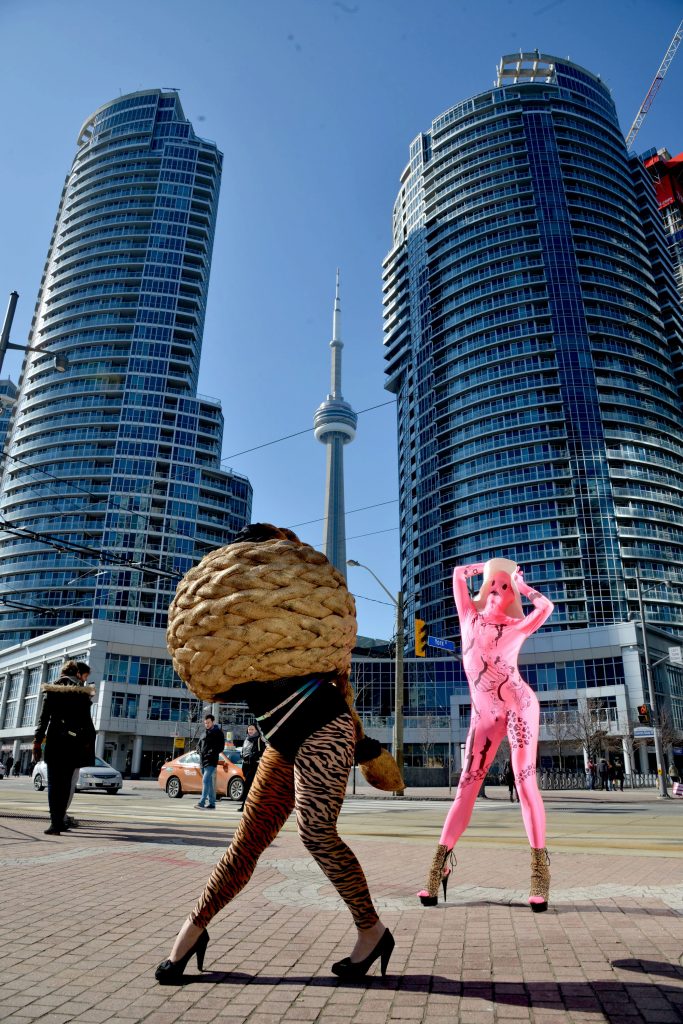
The third comic Williams launches this season builds on his growing body of work paying tribute to female pop titans like Beyoncé and Britney, this time as a tribute to the Australian pop star and gay icon Kylie Minogue. How Does it Feel in My Arms will be released as a part of LeyLines, a miniseries that challenges cartoonists to make work about the the artistic forces that inspire them. While other artists have chosen more canonical figures such as Egon Schiele and Gertrude Stein, Williams’ contribution will look to Minogue’s song “In My Arms” for inspiration, analyzing the lyrics in conversation with the anarcho-utopian politics of turn-of-the-century Russian thinker Pyotr Kropotkin. When asked about his commitment to diva figures, Williams’ answer is as political as it is personal.
“As a sissy gay boy who was made fun of pretty mercilessly, I had to learn to conceal my appreciation and affinity for femininity,” he explains. “Over the past few years, I’ve been excavating that love for women. It feels therapeutic to explore the sensibility I was ashamed of… and I think feminine energy is so needed in the world, and it might be the thing that saves us as a species. Women get shit done — and men have held so much power for so long, and look where that’s gotten us.”
As Toronto continues to morph and transform, it is incumbent upon artists like Eric Kostiuk Williams to tell that story, to reimagine it, and to challenge the forces that exploit and push out artists, divas, and pleasure-seekers the world over to make room for boring people — especially when the blame sometimes falls on the artists themselves.
“It’s such a messy uncomfortable thing to talk about. Most artists don’t want to see themselves that way,” admits Williams. “But that’s all the more reason to talk about it.”
Babybel Wax Bodysuit, Big Planet/Retrofit Comics, 20pgs, $6, bigplanetcomics.com
Condo Heartbreak Disco, Koyama Press, $10, koyamapress.com
How Does It Feel In My Arms, Czap Books/ LeyLines, $6, czapbooks.com
